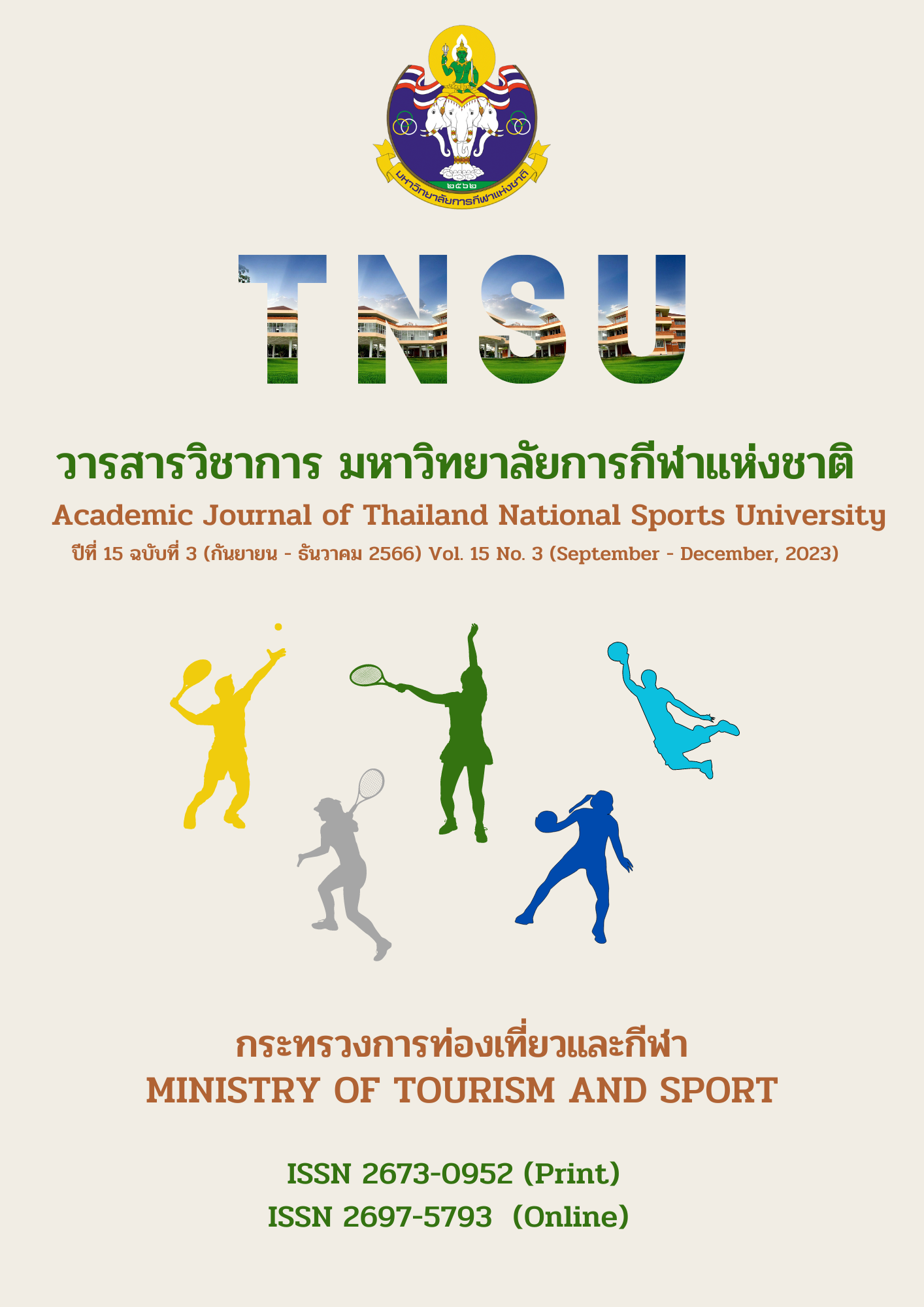DEVELOPMENT OF HEALTH EDUCATION PROGRAM APPLYING SELF - EFFICACY AND SOCIAL SUPPORT TO ENHANCE EXERCISE BEHAVIORS OF UNDERGRADUATE STUDENTS AT THAILAND NATIONAL SPORTS UNIVERSITY YALA CAMPUS
Main Article Content
Abstract
This developmental research aims to 1) develop health education program to enhance exercise behaviors by applying self-efficacy and social support for undergraduate students and 2) investigate the effects of using health education program applying self - efficacy and social support to enhance exercise behaviors of undergraduate students. The participants were selected using purposive sampling including 60 undergraduate students at Thailand National Sports University who were interested to do exercise, without chronic diseases, and pleased to participate in the program. They were divided into 2 groups, 30 each; the experimental and control groups. 10 weeks of the experiment were given to the experimental group. The research instruments included 1) health education program applying self - efficacy and social support to enhance exercise behaviors and 2) exercise behavior questionnaire. The data from pre and posttests for independent t - test were collected and analyzed using descriptive and inferential statistics in order to compare the statistical significance differences. The findings revealed that the developed health education program could be practical to enhance exercise behaviors. The statistical significance of exercise behaviors of the experimental group using health education program to enhance exercise behaviors by applying self - efficacy and social support was found at the level of 0.01.
Article Details

This work is licensed under a Creative Commons Attribution-NonCommercial-NoDerivatives 4.0 International License.
The published article is a copyright of the Academic Journal of Thailand National Sports University. The passage appeared in each article in this academic journal is a perspective of each author which is not related to the journal. Each author is required to be responsible for all components of his/her own article. If there are any mistakes, each author must be responsible for those mistakes on his/her own.
References
Aksorn Yoowang, & Buathong Sawangsopakul. (2020). Self - efficacy, health perception, self - motivation and health promotion behavior of the elderly at the elderly club in Tambon Jed Rew, Samut Sakhon Province. Journal of Liberal Arts, Thammasat University, 20(2), 264 - 281
Arpaporn Powwattana, Sirintorn Kalampakorn, Sunee Lagampan, & Tassanee Rawiworrakul. (2018). Health promotion and disease prevention in community: An application of concepts and theories to practice. N.P.: M N C0mpute Offset.
Bandura, A. (1986). The explanatory and predictive scope of self - efficacy theory. Journal of Social and Clinical Psychology, 4(2), 359 - 373.
Bandura, A. (1997). Self - Efficacy the Exercise of Control. New York: W. H. Freeman and Company.
Bangonsri Jindawong & Piyathida Kuhirunyaratn. (2021). Effect of social support program on health promotion behaviors among community dwelling elderly. KKU Research Journal (Graduate Studies), 21(1), 229 – 241.
Caplan, G. (1976). Support systems and community mental health. New York: Behavioral Publication.
Centre for SDG Research and Support. (2021). ‘Not moving, not exercising’ increases the risk of non - communicable diseases such as dementia and high blood pressure. Retrieved from https://www.sdgmove.com/2021/04/01/physical-inactivity-associated-with-ncds-and-deaths/
Department of Physical Education. (2018). Exercise or sports information of the public for the year 2018. Retrieved from https://www.dpe.go.th/article-preview-441291791792
Evans, R. J. (1989). Albert Bandura: The man and his ideas - A dialogue. New York: Praeger.
International Health Policy Program. (2022). Move that mountain. Retrieved from http://www.thaincd.com/document/file/download/knowledge/Movethat_MountainFinal65
Kesinee Saranrittichai. (2021). Health Literacy: Concepts, Theories and Applications (2nd ed.). KhonKean: KhonKean University.
Khodaminasab, A., Reisi, M., Vahedparast, H., Tahmasebi, R., & Javadzade, H. (2019). Utilizing a health - promotion model to predict self-care adherence in patients undergoing coronary angioplasty in Bushehr, Iran. Patient Preference and Adherence, 13.
Kiess, H. O. (1989). Statistical Concepts for the Behavioral Sciences. Biston Allyn and Bacon.
Napatsawan Thanaphonganan, Prasansil Khumhong, & Worraphol Waengnork. (2019). The effectiveness of applying self - efficacy theory on promoting exercise behaviors of the elderly in Borabue District, Mahasarakham Province. The Public Health Journal of Burapha University, 14(1), 106 – 118.
Peter T. K., Christine F., Eric J. S., & I - Min Lee (2021) Physical inactivity and non - communicable disease burden in low - income, middle - income and high - income countries. British Journal of Sports Medicine, 56(2), 101 – 106.
Polit, D. F., & Hunger, B. P. (1995). Nursing Research: Principles and Methods. Philadelphia: Lippincott.
Sompoch Iamsupasit. (2007). Theories and Techniques in Behavior Modification. Bangkok: Chulalongkorn University Printing House.
Thailand National Sport University. (2019). The Thailand National Sport University Act B. E. 2562. Retrieved from http://www.tnsu.ac.th/web/web3/o6.pdf
Thanumporn Thonglong, & Parkpoom Jangphonak. (2022). Affecting exercise behavior of the students of Udon Thani Rajabhat University Sam Phrao Campus. Journal of Sports Science and Health Innovation, Rajabhat University Group of Thailand, 1(3), 23 – 33.
Wannapa Praphasorn, & Ornchaporn Cherdnok. (2019). Predicting factors exercise behaviors of hypertensive elderly people in health center Krapo, Thatoom District, Surin Province. Journal of Nursing, 37(3), 30 – 39.


